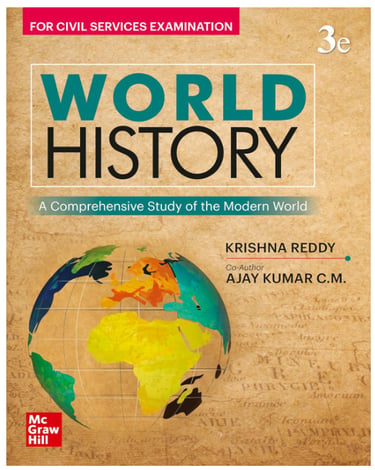Industrial Revolution
What is industrial revolution? In this article, we will take in-depth information about when it happened, its impacts and its importance in history. The topic is important for General Studies Paper 1 of Mains Examination.
WORLD HISTORY
What is industrial revolution?
The Industrial Revolution was a period from the middle of the 18th century to the beginning of the 19th century that saw dramatic changes in the production of goods.
During this period, most of the production processes, which were previously based on human and animal power, began to use new artificial and mechanical resources.
It started in Europe (particularly Britain) and later spread to America.
Iron and textiles were the first to benefit from the Industrial Revolution and the production of iron and textiles increased enormously. Later, the production of other goods also increased.
Due to this, many major socio-economic changes took place.
Reasons behind the Industrial Revolution (Why did the Industrial Revolution happen?)
Economic and Political Competition:
The newly emerging nation-states (Nation-States) started economic-political competition among themselves. These nation-states wanted to capture the markets of Europe and the world by increasing their industrial productivity and production.
Scientific Revolution in Europe:
Due to Renaissance (Renaissance) the people of European countries came out of the bondage of religion and karma and a scientific approach was created in them.
Researchers like Newton, Darwin promoted scientific research.
James Watt invented the steam engine that helped fuel the Industrial Revolution; Stephenson invented the railway engine which made it possible to transport heavy raw materials to factories and manufactured goods to distant markets.
Agricultural Reforms in Britain:
Enclosure Acts were passed in Britain from the year 1604. According to them, socially owned lands were privatized. As a result, wealthy people bought land from the government and farmed it for their own profit (previously collective farming was more prevalent - low productivity and collective profit).
On the one hand agricultural productivity increased, income increased and on the other hand people who did not own agricultural land came to work as agricultural labourers.
As a result, many people from rural areas started moving to cities in search of other livelihoods; Later they turned into industrial workers.
Geographical Exploration and World Trade:
From the 16th century, sea voyages of exploration by European countries became successful; New lands were discovered and new sea routes became available for trade.
This boosted global trade.
Industrial revolution was also needed to meet the demands of new markets.
New Financial Institutions:
In the 17th century Europe, two major groups emerged in the financial sector - capitalists and financial institutions (eg Bank of England - 1694).These two groups provided financial support to the industrial revolution.
Coal and Iron:
The best quality coal was available in Britain. Due to this, coal was used as a source of energy in industries. Iron made it possible to make large machines.
Also, iron began to be used to make ships and engine compartments that could carry goods over long distances.
Effects of Industrial Revolution:
I. Political:
Colonialism: In order to have a reliable source of raw materials for their industries and a reliable market for their products, European industrial revolution countries started to establish their colonies in other industrially and militarily backward countries of the world (e.g. India, Britain's East Indies). Company established its colony).
Due to this, these backward countries went under the slavery of European countries.
World War I (1914-18): The race of European countries to establish their colonies in other parts of the world and countries later created the fertile environment for World War I.
Labour/Labor Organizations and Movements: Industrial workers formed their unions and unions to promote their interests. This was the beginning of labor movements in the history of the world (the establishment of the Labor Party in England in 1900; later this party became the main political party there).
II. Financial:
Increase in Industrial Productivity and Production: The Industrial Revolution led to a significant increase in industrial productivity. Industrial production increased.
Due to this, the economy of the industrially advanced countries was boosted. A large amount of employment was created in the industrial sector.
Development of cities: Established cities developed and new cities emerged. As the rural areas could not develop as fast as they could, the villages fell behind and the Urban-Rural Divide was created which continued to widen.
Poverty in the Colonies: As the colonies were economically exploited, poverty spread there.
III. Social:
Emergence of new social groups: Proletariat = Workers and Bourgeois = Capitalists. There was always an atmosphere of tension in these groups and occasional clashes started.
This also led to the emergence of urban slums: Where massive economic and social exploitation of industrial workers was evident. Due to the unhygienic environment there, health problems were created for the poor workers.
Exploitation of Women and Children: Women and children were also forced to earn money to cope with inflation in the cities. Women and children were also heavily exploited in the industries. Long working hours and lack of safety mechanisms created health and safety issues for them.
Decline of Cultures: Caused by Colonialism. Colonization led to the decline of many small cultures. The European countries implemented their Western culture in their colonies and damaged the culture of the colonized people by belittling them out of their sense of racial superiority. This led to the extinction of many small cultures, such as tribal cultures.
Practice Question:
Why did the industrial revolution first occur in England? (UPSC-2015; 150 Words, 10 Marks)
औद्योगिक क्रांति सबसे पहले इंग्लैंड में क्यों हुई?
Discuss the quality of life of the people in England during the industrialization. How does it compare with that in India at present? (UPSC-2015; 150 Words, 10 Marks)
औद्योगीकरण के दौरान इंग्लैंड में लोगों के जीवन की गुणवत्ता पर चर्चा करें। इसकी तुलना वर्तमान में भारत से कैसे की जाती है?



